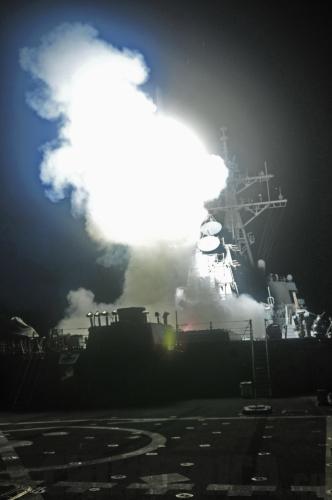|
 |
|
FIRST STRIKE: Coalition forces launch missiles and (XINHUA) |
When Rafale, Mirage 2000 and other fighter-bombers from Western coalition forces circled the Mediterranean region bound for Libya and Tomahawk cruise missiles whistled into the North African country, the world held its breath. Domestic street protests had moved to civil conflicts and foreign military operations in little over a month.
France took the lead, dropping the first bomb on March 19, in the first round of air raids against Gadhafi's forces. The air raid reportedly occurred soon after a Libyan military spokesman said that a ceasefire would start from 9 p.m. local time (19:00 GMT) in response to an African Union's call to cease fighting between government and anti-government forces. A day earlier on March 18, Libyan Foreign Minister Musa Kusa also declared an immediate ceasefire after the United Nations Security Council backed a resolution authorizing a no-fly zone over Libya and "all necessary measures" - code for military action - to protect civilians.
France takes lead
"It is not strange for France to be so eager to launch military operations against Libya since it has interests both economically and politically in the North African country," Zhang Zhongxiang, Deputy Director of the Department of West Asian and African Studies of Shanghai Institute for International Studies, told ChinAfrica.
France is the first country to recognize Libya's anti-government leadership in the eastern city of Benghazi and regarded the Libyan National Council, which was set up after the uprising in Libya erupted, as the sole legitimate representative of the Libyan people. This directly led to Gadhafi government's announcement of breaking its diplomatic relations with France.
"From this angle, France has no other choice but to topple the Gadhafi government in order to maintain its interests there," said Zhang.
For France, and Europe as a whole, Libya's oil industry is an important investment market. By October 2010, the number of French companies operating in Libya was 32, mainly in the energy field. According to a report on TIME magazine's website, French enterprises have invested several billion dollars in Libya's oil sector.
Geopolitically, Libya is also very important to France, according to Zhang. After being sworn in as French president in 2007, Nicolas Sarkozy further strengthened ties with African countries. In July 2008, Sarkozy was instrumental in establishing the Union for the Mediterranean, which includes 27 European Union members and 16 non-EU members. This organization is expected to play roles in anti-terrorism campaigns, dealing with immigration problems, encouraging regional trade development and promoting democratic progress. Libya, though bordering the Mediterranean Sea, refused to join the organization.
|